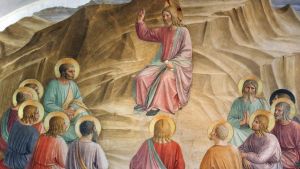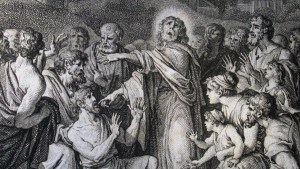Among the many accounts of the miracles Jesus worked which are recorded in the New Testament, the healing of the deaf man in Mark 7 is particularly memorable. By commanding “ephphatha”—that is, “be opened”— Jesus summarizes his saving mission.
The Gospel recounts the episode, saying, “He took him off by himself away from the crowd. He put his finger into the man’s ears and, spitting, touched his tongue; then he looked up to heaven and groaned, and said to him, “Ephphatha!”— that is, “Be opened!” — And immediately the man’s ears were opened, his speech impediment was removed, and he spoke plainly” (Mark 7:34-35).
Our Lord’s actions are so deliberate. First, see how Jesus pulls the man aside. There is an intimacy to their encounter. This healing is a moment where the Lord is present just to this one man alone.
In addition, the episode is very physical. Christ puts his finger in the man’s ears, and spitting, touches his tongue. The contactus, the physical contact of the Lord and another, recalls the gentle touch of a physician. Christ acts directly upon those he heals.
Finally—and this is perhaps the reason the episode is so memorable—Christ gives a clear command. “Ephphatha,” says the Lord; “Be opened,” Jesus commands. This distinct Syriac (or, according to some scholars, perhaps Aramaic) word, ephphatha, summarizes the work of Christ’s ministry. He came to open.
Christ opens the heavens
In the Gospel accounts of the Lord’s baptism, we read: “After Jesus was baptized, he came up from the water and behold, the heavens were opened [for him], and he saw the Spirit of God descending like a dove [and] coming upon him” (Matthew 3:16). By the grace of baptism, the Lord pours forth the gifts of heaven. Jesus, by initiating the sacraments opens the gates of heaven for us.
Jesus opens the scroll
Following his baptism, the Lord began his public ministry. Luke’s Gospel states, “He came to Nazareth, where he had grown up, and went according to his custom into the synagogue on the sabbath day. He stood up to read and was handed a scroll of the prophet Isaiah” (Luke 4:16-17). Christ opened the scroll, and fulfilled the teaching of the prophecy he read. Later in Luke’s Gospel, while walking with disciples on the road to Emmaus on the day of the resurrection, Jesus opens the scriptures. the life and ministry of Christ fulfill all the prophecies and wonders of Israel’s history.
Our blessed Lord opens eyes
In a miraculous healing recorded in John’s Gospel, a miracle not unlike the opening of the ears of the deaf man in Mark, Jesus gives sight to a blind man. “He spat on the ground and made clay with the saliva, and smeared the clay on his eyes, and said to him, ‘Go wash in the Pool of Siloam’ (which means Sent). So he went and washed, and came back able to see” (John 9:6-7).
The man born blind was able to see. By working this miracle, Our Lord opened the eyes of witnesses of the miracle to see the Son of God. The opening of eyes to the person of Christ starkly contrasts with those who cannot see who Christ is.
Jesus opens the tomb
When his friend Lazarus dies, Jesus arrives and commands those gathered to open the tomb. “He cried out in a loud voice, ‘Lazarus, come out!’ The dead man came out, tied hand and foot with burial bands, with his face wrapped in a cloth. So Jesus said to them, ‘Untie him and let him go’” (John 11:43-44). This astonishing miracle foreshadowed Christ’s own resurrection; his victory over death. Christ opened his grave and fulfilled the prophecy of Ezekiel, “Thus says the Lord God: Look! I am going to open your graves; I will make you come up out of your graves, my people, and bring you back to the land of Israel” (Ezekiel 37:12).
The opening of minds and hearts
Physical isolation, the separation no doubt caused by closure of the deaf man’s ears, is symbolic of a deeper closure, a greater suffering. Pope Benedict XVI says, “There is an inner closing, which covers the deepest core of the person, what the Bible calls the ‘heart.’ That is what Jesus came to “open,” to liberate, to enable us to fully live our relationship with God and with others.” Jesus’ intervention changes the horizon of our destiny, opening us to the heights of God’s love.
Pope Benedict explains, “This little word, ‘Ephphatha – Be opened,’ sums up Christ’s entire mission. He became man so that man, made inwardly deaf and dumb by sin, would become able to hear the voice of God, the voice of love speaking to his heart, and learn to speak in the language of love, to communicate with God and with others.” Christ frees us from the chains of sin, from slavery to darkness, and makes us free to hear and speak of the glory of God’s grace.





